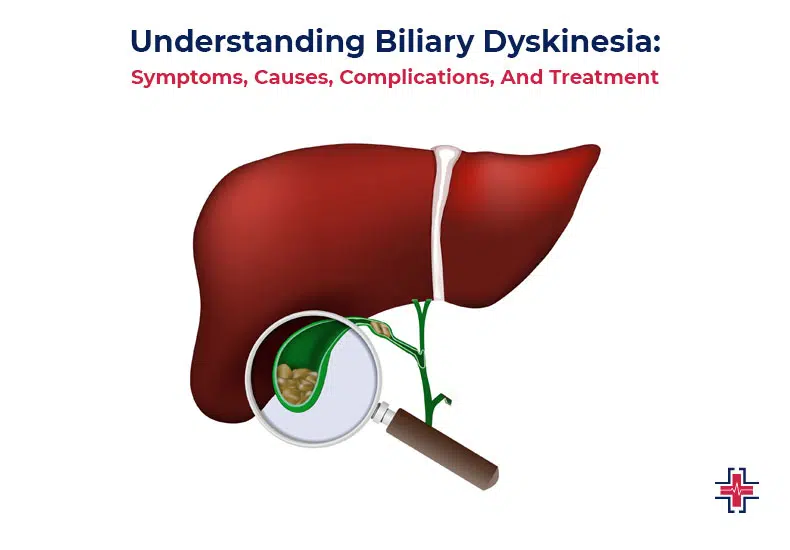
Introduction
Biliary dyskinesia is a disorder affecting the movement of bile from the gallbladder into the digestive tract. It occurs when the gallbladder does not function properly, leading to digestive discomfort and pain. Many people wonder what contributes to biliary dyskinesia causes and whether they can prevent this condition. Understanding its root causes can help in early diagnosis and management.
What Is Biliary Dyskinesia?
Biliary dyskinesia refers to a motility disorder where the gallbladder fails to release bile efficiently. Bile is essential for digesting fats, and when the gallbladder does not function well, it can lead to pain, bloating, and nausea.
7 Major Causes of Biliary Dyskinesia
1. Gallbladder Motility Dysfunction
- The primary cause of biliary dyskinesia is the inability of the gallbladder to contract and empty bile properly.
- This can be due to nerve dysfunction or poor muscle coordination in the bile ducts.
2. Hormonal Imbalances
- Hormones play a significant role in gallbladder function.
- An imbalance in estrogen and progesterone can lead to inefficient bile release, making women more susceptible, especially during pregnancy or menopause.
3. Chronic Stress and Anxiety
- The digestive system is highly sensitive to stress.
- Chronic stress can disrupt bile flow by altering the signals sent to the gallbladder, leading to spasms or inefficient contractions.
4. Poor Diet and Eating Habits
- High-fat and low-fiber diets are major contributors to gallbladder dysfunction.
- Consuming excessive processed foods and fried items can worsen bile movement.
- Irregular eating patterns can lead to gallbladder stagnation, where bile accumulates and thickens over time.
5. Nervous System Disorders
- Neurological conditions like Parkinson’s disease or multiple sclerosis can affect gallbladder motility.
- The vagus nerve, which helps control digestive processes, can be impaired, leading to bile flow issues.
6. Post-Cholecystectomy Syndrome
- Some people who have had their gallbladder removed (cholecystectomy) may experience biliary dyskinesia-like symptoms.
- This occurs due to bile duct dysfunction or poor regulation of bile flow after surgery.
7. Inflammation and Infections
- Chronic inflammation of the bile ducts (cholangitis) can restrict bile flow.
- Infections in the liver or gallbladder can also contribute to biliary dyskinesia by impairing normal function.
Symptoms of Biliary Dyskinesia
- Persistent upper right abdominal pain
- Nausea and vomiting
- Bloating and discomfort after eating fatty foods
- Unexplained indigestion
- Episodes of acid reflux
- Fatigue due to poor nutrient absorption
Diagnosis of Biliary Dyskinesia
Doctors use several methods to diagnose biliary dyskinesia, including:
- HIDA Scan (Cholescintigraphy): This test measures gallbladder function by assessing how well bile is ejected.
- Ultrasound: Used to check for gallstones or structural abnormalities.
- Blood Tests: To rule out infections or liver dysfunction.
- Endoscopic Ultrasound (EUS): A more detailed imaging test to evaluate bile duct health.
Treatment Options for Biliary Dyskinesia
1. Lifestyle and Dietary Changes
- Eating a low-fat, high-fiber diet
- Avoiding processed and fried foods
- Maintaining a regular meal schedule
- Drinking plenty of water to keep bile flowing
2. Medications
- Pain relievers to manage discomfort
- Antispasmodic drugs to relax bile ducts
- Digestive enzymes to improve fat breakdown
3. Surgery (Cholecystectomy)
- If symptoms are severe and persistent, gallbladder removal surgery may be recommended.
- Many patients find relief after surgery, but post-cholecystectomy symptoms should be monitored.
4. Alternative Treatments
- Acupuncture and herbal supplements like milk thistle may support bile flow.
- Stress management techniques like yoga and meditation can improve gallbladder function.
How to Prevent Biliary Dyskinesia
- Maintain a balanced diet rich in fiber and lean proteins.
- Exercise regularly to support digestive health.
- Manage stress through relaxation techniques.
- Stay hydrated to prevent bile stagnation.
- Schedule regular medical checkups to monitor gallbladder health.
FAQs
1. What triggers biliary dyskinesia?
Hormonal imbalances, poor diet, stress, and nerve disorders are common triggers.
2. Can biliary dyskinesia go away on its own?
Mild cases may improve with lifestyle changes, but chronic cases often require medical intervention.
3. How is biliary dyskinesia diagnosed?
A HIDA scan is the most accurate test to assess gallbladder function.
4. Is surgery the only treatment option?
No, lifestyle changes, medications, and alternative therapies can also help manage symptoms.
5. Does stress affect biliary dyskinesia?
Yes, chronic stress can disrupt bile flow and worsen symptoms.